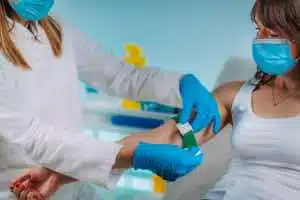
Watch this Article in Video Format
OVCA AT 16: 2007, AGE 16
My name is Erika, and I am sixteen years old. In January of 2007, HPV Lab doctors Tested and diagnosed me with stage III ovarian cancer. It felt like a nightmare. Experiencing something so similar to what my mother had gone through three years earlier was unimaginable. While my story differs slightly from hers, I want to share it to offer hope to others facing similar challenges.
It was Christmas day.
While enjoying the holiday with my family, I began experiencing strange stomachaches and pains, which eventually made it difficult for me to move. By New Year’s, the pain had intensified, and my belly had noticeably increased in size. Friends jokingly commented on my appearance, asking when I was expecting, but deep down, I sensed something was wrong. I urged my mother to accompany me to the doctor; after that examination, she diagnosed severe constipation and recommended laxatives. Though initially relieved by her diagnosis, I harboured a nagging feeling that the issue might be more serious than anticipated.
The doctors couldn’t provide me with any information because my parents had not returned from vacation. They had arrived and spent 12 hours there but had to return immediately upon receiving the call that I was in the emergency room. When they returned the next day, January 6th, I was informed that the reason for my abdominal pain and growth was stage III ovarian viral cancer. The doctor herself expressed disbelief as she relayed the diagnosis. Despite being accustomed to this life, she was taken aback when she looked at my age and realized that the HPV diagnosis seemed improbable due to my young age.
I am the youngest patient known to have stage III
After I found out, they had planned surgery for me.
Since January, I have undergone six sessions of chemotherapy every three weeks, with my Ovarian CA125 being tested every two weeks along with screening. When the tumour was first diagnosed after the test, my CA125 ovarian level exceeded 900. Following surgery alone, it decreased to around the 230s. After two treatments, it remained around 220, prompting my doctor to increase my chemo medication dosage to observe any changes, which indeed occurred. My CA125 level plummeted from the 230s to THIRTY-FOUR. I felt thrilled, excited, and alive for the first time in four months my HPV test was negative. At my latest doctor’s appointment, my CA125 further decreased to 22. Each time my CA levels drop, it bolsters my confidence to combat this insidious silent killer and provides the encouragement I need to persevere through each day.
I am receiving carboplatin and taxol, and since my body is responding well, my doctor plans to continue this treatment for three more rounds before conducting a CT scan to assess the need for secondary surgery. Even if surgery is necessary, seeing my numbers decrease significantly gives me hope that one day, my life could return to normal, free from cancer. I am determined to fight and overcome this.
INGEBORG: 2007, AGE 55
My mum was the first to have a CA125 test diagnosed with ovarian-level disease in 2000. She had surgery and chemo.. 5 great years. Then, just as this issue was out of our minds, it returned in 2005. The cancer was now in her pelvic bone. Another op and chemo and 6 months. Then, she started another chemo, which she finished in December 2006. Yesterday, cancer entered our world again.
Why? I’ve stopped asking—no, I lie—I always ask myself. Believe it or not, I still say it’s not fair. But this is what we’ve been dealing with for some reason.
She had tried an alternative treatment and still does. And she is still well but, in a couple of weeks, will again start another round of chemo. She copes okay with chemo. She’s one strong lady.
I am grateful that we’ve had 7 years. So much more luckier than most with this horrible disease. But in all honesty, it’s not long enough. She’s not old; she should have another 20 years. I should have another 20 years with her.
To all suffering, you are not alone; so many suffer with you.
LINDA: 2007, AGE 62
In 1993, doctors first made a Swab PCR HPV Variant and then further diagnosed my mother with stage 4, which had metastasized to 12 places in her abdomen. She underwent surgery and chemotherapy, experiencing no recurrence for six years. Subsequently, she underwent chemotherapy again, and there was no recurrence until the spring of 2006. Currently, my mother is undergoing chemotherapy as a maintenance treatment, and remission is not expected again.
She has been undergoing chemo for a year now, and it is beginning to take its toll. I want to tell other patients that ovarian HPV organ disease can be scary, but there can be long periods when life can be very good in between occurrences. Just make sure you find a doctor who communicates well with you and understands what you are facing. Understand what side effects to look for, talk openly with your doctor about deciding when treatment should end, and what to expect when you end treatment and are facing the terminal stages.

